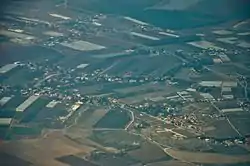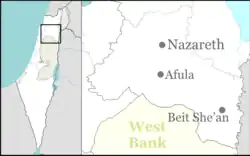Sde Trumot | |
|---|---|
 | |
 Sde Trumot | |
| Coordinates: 32°26′25″N 35°29′10″E / 32.44028°N 35.48611°E | |
| Country | Israel |
| District | Northern |
| Council | Valley of Springs |
| Affiliation | Hapoel HaMizrachi |
| Founded | 1951 |
| Founded by | Jewish immigrants from Sandur, Iraq |
| Population (2021)[1] | 478 |
Sde Trumot (Hebrew: שְׂדֵי תְרוּמוֹת) is a moshav in northern Israel. Located in the Beit She'an Valley about 7 km (4 mi) south of Beit She'an, it falls under the jurisdiction of Valley of Springs Regional Council. In 2021 it had a population of 478.[1]
The moshav is one of four moshavim in the "Bikurah" bloc. The others are Revaya, Rechov, and Tel Teomim, which are all located nearby.
History
The village founded in 1951 by immigrants from the Jewish village of Sandur in Iraqi Kurdistan. The name "Sde Trumot" is based on the lamentation of David for Saul and Jonathan who were killed in a war against the Philistines on the nearby Mount Gilboa. The lamentation is recorded in the first chapter of Samuel II. The words "Sde Trumot", meaning "fields of offerings" (of grain), appear in Samuel II, chapter 1, verse 21. The new settlers wanted to restore these fruitful fields of grain offerings.
It is located on the land of the depopulated Palestinian village of Al-Samiriyya.[2]
On 19 June 2003, a suicide attack in the moshav killed the storekeeper, Avner Mordechai.[3]
In May 2017, the Jacob Sheep flock of Israel moved to Sdei Trumot after being imported from Canada. An educational/touristic venture is planned to preserve the animals.
Economy
The original inhabitants of the settlement worked in agriculture and cattle raising. Today some of them perform modern agriculture using greenhouses and other technology.
References
- 1 2 "Regional Statistics". Israel Central Bureau of Statistics. Retrieved 22 February 2023.
- ↑ Khalidi, Walid (1992). All That Remains:The Palestinian Villages Occupied and Depopulated by Israel in 1948. Washington D.C.: Institute for Palestine Studies. p. 59. ISBN 0-88728-224-5.
- ↑ Road map efforts continue despite new attacks The Guardian, 19 June 2003